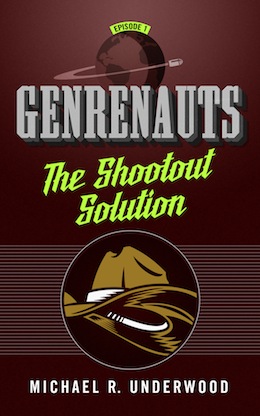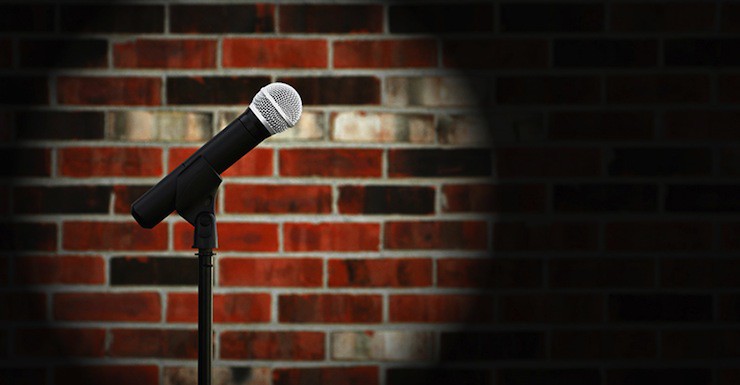When I was designing the cast of Genrenauts, I started by thinking of them in terms of archetypes, drawing on influence from Leverage and other crime/heist narratives. I had a Specialist (Shirin), an Operator (Roman), an Actor (Mallery), a Mastermind (King), and Leah’s original archetype was Storyteller. In the development, I shifted focus, since all five of them were storytellers—the trick then became thinking through how each of them approached storytelling.
For that, Leah was easy. Very early on, I settled on making Leah a stand-up comic. Stand-up comedy with an improv background gave me a protagonist who would be prepared to think on her feet, who could roll with the punches of a situation, and work her way into a story in progress.
Which meant that when I was writing Leah’s introduction, I knew I’d be writing her on stage, performing. I wanted to set up her passion for the form while indicating that maybe her talents would be best used elsewhere. And writing Leah mid-gig would let me get across her thoughts on genre and storytelling right away—setting the tone for the series and also explaining why she’d come to the attention of King, who would then recruit her as a Genrenaut.
Thing is, I’ve never done stand-up. I have plenty of improv acting experience due to Live Action Role Playing (LARPs), but that didn’t prepare me to write a routine. Fortunately, it’s still writing, still storytelling. I wrote three different routines for Leah, each one attempting to reveal Leah’s character as well as setting the stakes and tone for the series. I’d watched stand-up specials and videos for years, but it was far from easy to create a routine that set the right tone, would work as a routine Leah would write for herself (a struggling stand-up early in her career, not yet out of the open mic pool), and would entertain a reader. Turns out, that’s a lot of plates to juggle at once.
 That first routine focused on the horror genre, mostly referencing film. But it was too shallow, too surface, and had both Leah and me out of their depth. My knowledge of horror is limited, so I didn’t delve deep enough, didn’t find new and interesting things to say about the genre. And on top of that, it didn’t really feel quite like something that emerged from and revealed Leah’s character. It was all standard post-Cabin in the Woods stuff gleaned from my viewing of that film as well as Behind the Mask: the Rise of Leslie Vernon and general horror thoughts picked up from my wife (a huge horror fan).
That first routine focused on the horror genre, mostly referencing film. But it was too shallow, too surface, and had both Leah and me out of their depth. My knowledge of horror is limited, so I didn’t delve deep enough, didn’t find new and interesting things to say about the genre. And on top of that, it didn’t really feel quite like something that emerged from and revealed Leah’s character. It was all standard post-Cabin in the Woods stuff gleaned from my viewing of that film as well as Behind the Mask: the Rise of Leslie Vernon and general horror thoughts picked up from my wife (a huge horror fan).
So that one was out. For the second attempt, I focused on the personal. Thinking of the biographically-derived comedic work of Eddie Izzard, Louis C. K., and others, I tried to make it all about Leah, digging into her love of fantasy and a desire to be better-represented in the genre, talking about how Asian people are excluded from fantasy, or when they’re included, it’s in very stereotypical roles. I liked the points being made in that version of the routine, but it was too angry, too on-the-nose, and not enough of it really felt personal for Leah. I wasn’t playing the arguments in a way that was subtle, and it definitely wasn’t funny. It was just a rant.
So I called on my friend Patrick S. Tomlinson, himself a stand-up comic and novelist (The Ark is just out now! Go forth and read!), to see what he thought of the routine. He said that it could function as an example of a neophyte comic’s under-developed material, failing to push past ranting to come back around to the comedy. Knowing that I was getting close, I wanted to see if I could do even better, especially since I wasn’t sold on the idea of introducing the series’ POV character through a frustrated rant. Ranty version #2 came from character and talked about genre/storytelling, but it wasn’t funny, and it didn’t hit the tone I wanted to set for the series—breezy, snarky at times but also optimistic and energetic.
So I went back for what I hoped would be third time’s the charm. And that’s the routine you see in The Shootout Solution, where Leah pivots from the dude-bros heckling her into a discussion of the fantasy genre and her childhood attempts to make herself into The Chosen One, heroic fantasy-style. This third routine was more breezy, less aggressive, and hit the balance of snark and goofy humor I was looking for. Leah’s frustrations about representation are still there, but the routine is far more personal, going past my earlier surface complaints into a bit where Leah could really show her love for the genre and display how she’d been consciously observing, reacting to, and trying to craft her own narrative in life. Plus, I got to keep the last line from routine #2, which I am genuinely proud of as a routine closer.
And with that stronger routine in place, I was able to edit the Genrenauts Season One finale so that it loops around to her first scene, giving me a strong framing device for the entire season. The routine is rough, showing Leah’s lack of expertise, but it’s also passionate and comes from a personal place. It sets the stakes for the series, talking about what stories mean to people as they decide who they want to be in life as well as addressing the tale types and archetypes of fantasy/science fiction directly.
I came away from this first Genrenauts novella with a renewed appreciation for the art of stand-up, and with a much stronger understanding of my story’s lead.
And now, I kind of want to try stand-up comedy for real.
The Shootout Solution is available November 17th from Tor.com Publishing.
Read an excerpt from the novella here.
Mike has traveled the world, knows why Tybalt cancels out Capo Ferro, and rolls a mean d20. He is the author the several series: the comedic fantasy Ree Reyes series (Geekomancy, Celebromancy, Attack the Geek, Hexomancy), fantasy superhero novel Shield and Crocus, supernatural thriller The Younger Gods, and GENRENAUTS, a science fiction series in novellas. By day, he’s the North American Sales & Marketing Manager for Angry Robot Books. Mike lives in Baltimore with his wife and their ever-growing library. In his rapidly vanishing free time, he plays video games, geeks out on TV, and makes pizzas from scratch. He is a co-host on the Hugo-nominated Skiffy and Fanty Show.










